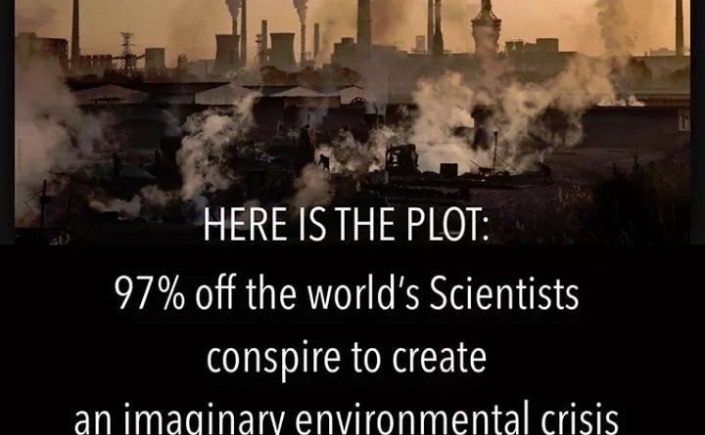|
| —Scott Westerfeld |
If you seriously believe that thousands of scientists worldwide are engaged in a massive self serving conspiracy with tax hungry governments and enviromental lobbies in order to attract grants, raise taxes and subjugate developing economies (especially India and China) all at the behest of the Illuminati or shape shifting lizard lords intent on a new world order then I guess rational arguments aren’t going to convince you otherwise.
But could deniers explain what possible motive scientists have to be “liars” and “frauds”? I can see why deniers would do so and clear evidence of their cherry picking. But why would scientists conspire together, and to do so for the best part of 40 years, to lie? Why would scientists from countries like China and India, who have nothing at all to gain from promoting science that could limit their economic growth, join in such a conspiracy? Why would scientists on the payroll of oil companies join such a conspiracy? Why would 194 governments in the world conspire with these scientists to create concern about a problem and then do NOTHING about it?
Why would every national science academy around the world, including our own Royal Society (who in 2014 published this in conjunction with the US National Academy of Sciences: https://royalsociety.org/policy/projects/climate-evidence-causes/ ), the vast majority of whose members are not climate scientists and do not benefit from grants allegedly used to “bribe” climate scientists? Why would (say) Lord Winston or Paul Nurse in quite different disciplines fully endorse the scientific output of these alleged “liars”?
It’s also an amazing coincidence that people politically predisposed to deny climate science have discovered that of all the scientists in the world, climate scientists are particularly corruptible.
You see, scientific research is a pretty competitive environment. No scientist would endorse the work of other scientists if that work is scientifically flawed. No scientist has a hope of getting to senior academic levels, let alone win a Nobel Science prize, by lying or performing corrupt science or even engaging in collective Groupthink. The modern scientific method is in place not to prevent such instances in the first place, but to quickly identify these when they do happen and to correct them. Why would scientists at (say) Oxford and Imperial endorse the scientists from “lesser institutes” such as Reading and UEA in the peer review process if they didn’t think the science met the high standard of the scientific method?
Scientific Journals would have to be in on such a conspiracy. They are independent of governments and academic institutions. Their reputations are based on the quality of science they publish. They have no interest whatsoever in publishing papers they know are subject to fraud, corruption, or any other failure to adhere to the rigours of the scientific method. It would destroy their reputations.
Moreover, if money is the objective, climate scientists are not especially well paid. Academics get paid anyway, irrespective of the outcome of their research, most are more than capable of getting much more lucrative employment elsewhere (they have highly advanced numerical, computing and analytical skills after all) and for those who might be motivated by money, why don’t they offer to prostitute themselves on behalf of oil and energy companies? Why don’t the deniers collectively contribute to a fund to invest in scientific research to seek alternative evidence and theories? The Koch brothers must have plenty of money to bribe scientists if they are as easily bribable as people appear to think. A fund of a few billion, peanuts in the big scheme of things, would surely motivate venal climate scientists to reach different conclusions. Indeed, this angle is also rather ironic considering that a sinecure at a denialist think tank can easily pay better than an actual post as a climatology professor.
However, the idea that scientists would lie and be selective says far more about those suggesting that and what motivates them than it does about anyone else, least of all scientists who are much more concerned about seeking the truth about the workings of the natural world.


